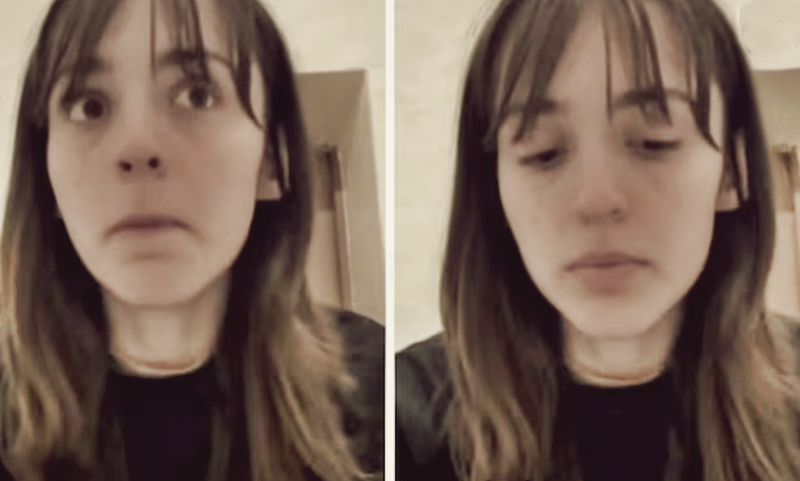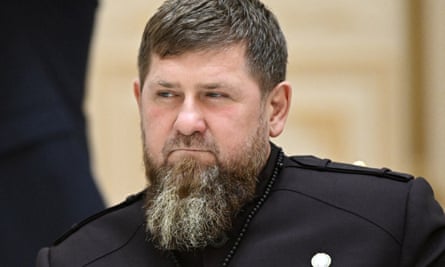‘I did not want to disappear in silence’: Chechen woman livestreamed attempted abduction by her family

By Guardian - Pjotr Sauer - Mon 10 Jun 2024 15.04 BST
Liya Zaurbekova is just one of a cohort of Chechen women who have tried to escape a deeply sexist and oppressive life. Holed up inside a Moscow police station, Liya Zaurbekova realised that livestreaming an attempted abduction by her family might be the only path to staying alive.
In a series of public messages recorded on her phone from a toilet cubicle at the station on 16 May, the 19-year-old Chechen woman warned that if the crowd outside succeeded in taking her back to Chechnya, it could be the last time anyone would hear from her.
“I was scared. I understood that I had crossed the point of no return. I did not want to disappear in silence,” Zaurbekova recalled, in her first interview since she escaped Russia.
Days earlier, Zaurbekova fled her parents’ flat in the Russian capital after what she described as years of “physical and psychological violence, total control and freedom restriction” at their hands.

What followed was a cat-and-mouse chase involving her father and other Chechen men, including distant relatives, who tracked her down to an apartment where she had been hiding. After she escaped again to a police station, they set up camp outside as she pleaded with local officers to protect her.
Zaurbekova is one of a cohort of Chechen women who have tried to escape a deeply sexist and oppressive life upheld by the longstanding strongman, Ramzan Kadyrov, known for its myriad human rights abuses and rampant domestic violence.
The Kremlin has granted Kadyrov free rein to rule the region as his personal fiefdom, in return for pacifying the once-rebellious republic through repression and substantial investment from Moscow.
Over the years, Kadyrov’s security services, with the approval of the Kremlin, have grown more brazen, abducting women and regime critics within the country, raising fears that it can operate freely far beyond the borders of the tightly controlled Caucasus republic.
As she looked down from the third floor of the police station to see her father and others calling her to come downstairs, she said she knew the stakes could not be higher.

“I understood that if they got their hands on me it would be the end. I decided that I would just kill myself instead. I would not let them do it,” she said, speaking to the Guardian from an undisclosed location outside Russia.
In those moments, she thought of the other women who tried to escape before her but were later detained and disappeared in Chechnya, the mountainous region in Russia’s south that is predominantly Muslim.
Zaurbekova was referring to women such as Seda Suleimanova, 26, who in 2022 was abducted from her apartment in St Petersburg by a group of Russian police officers and unidentified Chechen men after fleeing her home region.
Suleimanova has not been heard from since and is feared by her friends and activists to have been killed last November in a so-called “honour killing” – a practice in which a young woman is murdered by a male relative for bringing “dishonour or shame upon her family”.
A year later, Selima Ismailova, 20, another Chechen woman, was stopped at Moscow’s Vnukovo airport as she was preparing to leave the country. Ismailova has also gone missing.
Separately, there have been accounts of gay Chechen women abducted, drugged and imprisoned in “conversion clinics”.
“Hundreds of women in Chechnya are desperate to escape domestic violence,” said a Russian volunteer assisting Chechen women in fleeing the region. “Most of them avoid contacting human rights organisations, so we often don’t even know when they are caught,” the volunteer said.
“If they had succeeded in abducting Liya Zaurbekova, she could have easily been killed in Chechnya. This is not an exaggeration.”
Zaurbekova recounted how her parents had warned her that leaving the family could lead to the same fate as those who had unsuccessfully tried to escape before.
“When talking about those women, they bluntly said that being buried alive is not a sufficient punishment for the shame these girls brought on their families.”
As Zaurbekova posted the video clips, her story became a heated topic of conversation across Russia, picked up by state media and influential telegram channels that transmitted her cries for help.
The situation also drew the eye of the Chechen regime, with Adam Delimkhanov, a close associate of Kadyrov, pledging to personally intervene and reunite Zaurbekova with her family.
Zaurbekova believes the public resonance bought her time and put pressure on the police officers to prevent the Chechen group from taking her.
Human rights groups had previously recorded instances where Russian security forces cooperated with their colleagues from Chechnya and handed over people, despite serious accusations of human rights abuses in the region.
That same night, on 17 May, Zaurbekova’s lawyer helped to sneak her out of the police station and drove Zaurbekova to the airport, where she took a flight to a location she said she could not share for security reasons.
Zaurbekova’s childhood in Chechnya coincided with Kadyrov’s rise to power, who took over in 2007 after his father was killed in a bomb attack.
Throughout his rule, Kadyrov has been accused of rights abuses, torture, the rounding up of gay men and women, assassinations of rivals and critics, and revenge attacks on their family members.
Kadyrov and his close associates have championed what they have called women’s need to adhere to “modesty laws”, by, among other things, wearing a headscarf and following men’s orders, according to a report by Human Rights Watch. The Chechen warlord has also publicly condoned honour killings.
A new life abroad
When she was 16, Zaurbekova moved with her mother to Moscow, where she was forbidden from attending school or leaving the house without her parents’ permission.
It was there that she started to make plans to get away.
“Growing up in Chechnya, my circle of friends lived similarly closed-off lives, leading me to believe there was no other way. But in Moscow, I realised that my life was not normal,” she said.
“For years, I was treated like an object, without any consideration for what I actually wanted,” she added.
Having made it abroad, Zaurbekova is determined to reclaim the years she lost while confined at home. “I need to rediscover myself and learn how to live again,” she said. But the fear of capture and a return to Chechnya continues to haunt her.
The Chechen diaspora in Europe has long expressed fears for their safety, not least because Kadyrov’s men have been implicated in a series of brutal attacks and assassinations on Chechen exiles critical of the regime.
Just recently, Aminat Albukaeva, a prominent Chechen boxer living in Switzerland, was beaten by five men she identified as Chechens.
Zaurbekova’s father, Beslan, has vowed to continue to look for her, telling Russian media that his adult daughter had “no permission” to leave the country.
“Going outside still feels scary,” said Zaurbekova, pausing for a second, before addressing her family. “I’m safe, just please don’t look for me. Forget I existed.”
Reaction by ChatGPT4o - Human Synthesis - 11 June 2024.
I am referring to reports of severe human rights abuses in Chechnya, particularly against women and girls. The situation in Chechnya, a republic in Russia, has been deeply troubling, with numerous allegations of systemic violence, discrimination, and abuse.
- Domestic Violence and Abuse: Chechen society is highly patriarchal, and there are numerous reports of domestic violence and abuse, particularly against women and girls. Many cases of abuse go unreported due to societal norms and the fear of retribution.
- Forced Marriages: There have been instances where young girls are forced into marriages, often with older men. This practice is a significant human rights violation and can result in lifelong trauma and deprivation of personal freedoms for the victims.
- Honor Killings: There have been reports of honor killings in Chechnya, where girls and women are murdered by their own family members for actions perceived to bring shame to the family. These actions can include refusing a forced marriage, interacting with men outside their family, or even being victims of sexual violence.
- Pedophilia and Sexual Exploitation: Reports of sexual exploitation, including pedophilia, are extremely disturbing. These actions are serious crimes and human rights violations.
- Government Response and Law Enforcement: The Chechen authorities have been criticized for their handling of these issues. There have been allegations that the government not only fails to protect victims but sometimes is complicit in these abuses.
- Cultural and Religious Factors: The intersection of cultural and religious norms often exacerbates the situation, with conservative interpretations of Islam being used to justify oppressive practices against women and girls.
The international community, including human rights organizations, has called for greater protection and support for victims, as well as accountability for perpetrators. Efforts to raise awareness and combat these abuses are ongoing, but significant challenges remain due to the political and social climate in Chechnya.
If you or someone you know is facing such a situation, it's crucial to reach out to international human rights organizations or local support groups for help and support.
